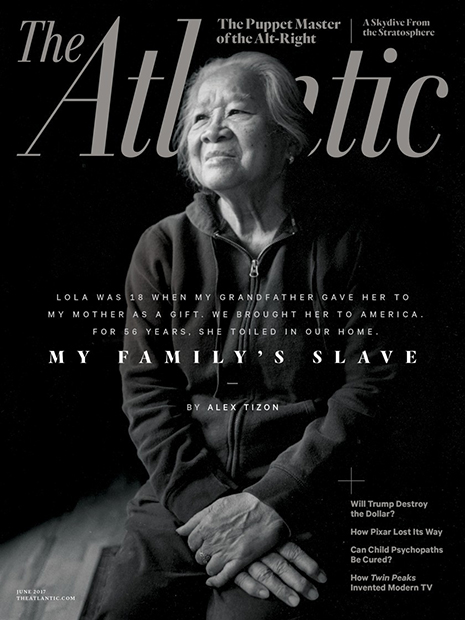
Alex Tizon’s “My Family’s Slave” about Eudocia “Lola” Tomas Pulido is The Atlantic’s June 2017 cover story. Image: The Atlantic official website
Alex Tizon’s “My Family’s Slave” went viral after its posting, striking a chord internationally, most especially within the Filipino community. It drew several reactions: from those sympathetic to Eudocia Pulido or Lola’s plight; to angry and hostile at the abuse she suffered and the lack of intervention from those who knew better.
While author and journalist Alex Tizon who passed away March 2017 can no longer respond to these comments, his daughter Dylan showed a glimpse of Lola’s life with their family, giving a touching tribute when she shared her father’s last article.
“It makes my heart ache,” she said, relating that when her father showed her the first draft of his essay, she returned with “puffy eyes.”
She spoke about his guilt: “He told me that it was the hardest thing he’d ever written. He also told me that this is the story he was meant to write; it was a heavy weight he had been carrying with him his whole life.”
She says that she recalls her Lola “a little differently,” and writes of Lola’s mundane daily activities, from relaxing in the garden with a “floppy sunhat and slip-on sandals” to “laughing hysterically at the most inappropriate times of a scary movie.”
But most of all, she remembered the selfless love that Lola shared with them: “I remember Lola loving me, my sister, my parents, my aunts, uncles, cousins, and every single person that walked into our house with her whole heart.”
Her post from May 16, 2017 reads:
“Seeing this woman on the cover of The Atlantic is hard to wrap my head around.
It makes my heart so full it could burst.
It makes my heart ache, too.
Before my dad died, he had me read the first draft of this story. After a few hours of reading (and intermittent sobbing), I returned to him with puffy eyes.
He told me that it was the hardest thing he’d ever written. He also told me that this is the story he was meant to write; it was a heavy weight he had been carrying with him his whole life.
I’ve had chills all day thinking about how full-circle it all is. How this, Lola’s Story, is his last piece of work being published.
What makes her story so painful to read is that I remember Lola a little differently:
I remember Lola smiling in her garden; wearing a floppy sunhat and slip-on sandals.
I remember Lola watching her melodramatic Filipino soap operas and asking, “Why are they always crying?!”
I remember Lola enthralled in her word-search puzzles.
I remember walking into the house to always be greeted with, “Did you eat??”
I remember seeing the joy on Lola’s face when she watched us devour her magical cooking.
I remember Lola laughing hysterically at the most inappropriate times of a scary movie.
I remember Lola reminding us again and again (and again) to put a jacket on.
I remember Lola loving me, my sister, my parents, my aunts, uncles, cousins, and every single person that walked into our house with her whole heart.
And it was a big heart.
The best I’ve ever known, and (no doubt) ever will.
I remember Lola as, for lack of a better word, an angel. To read this story makes my soul hurt. But it is a story that needed to be told.
For my family, it goes without saying, but for others, it might not be so obvious: we loved Lola immensely. Endlessly. Today is a heavy day because not only am I remembering Lola, but I am remembering my father.
Dad. As painful as it was, you told Lola’s story. And through it, you told your own. We are so proud of you. You may be gone now, but your words and legacy will live on forever.”
A 2011 video tribute from Tizon’s sister Maria contained candid and cheery photos of Lola, which included photos of Lola wrapped in hugs, cooking a meal, and even some wacky poses.
Tizon’s wife, Melissa Quiason, shared the video with the caption: “Lola was deeply loved by all of us and gave so much love and joy in return. As Alex always said, she was the best person we’ve ever known.” JB/rga
RELATED STORIES:
Alex Tizon, the man behind ‘My Family’s Slave’
Pulitzer Prize-winning Fil-Am journalist dies at 58 in Oregon